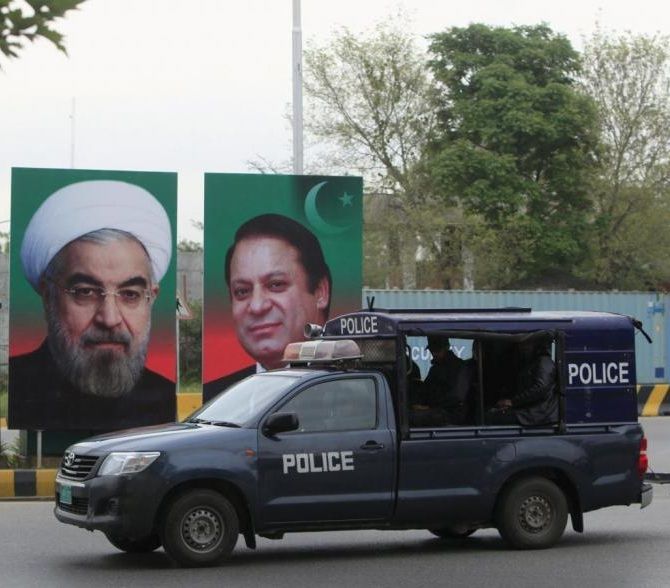In the Middle East, which is already coping with the Qatar-Saudi Arabia tensions, comes another pressure point.
Aveek Sen reports.

Late in April, we witnessed fresh tensions in Pakistan-Iran relations following the death of Iran's border guards by long-range weapons fired from Pakistani soil by terrorists.
The group involved was Jaish ul-Adl -- which in its earlier iteration as Jundullah -- had also been the reason for Iran's irritation with Pakistan, which is believed to aid and abet them.
Such terror attacks are common in Iran's Sistan-Baluchistan province.
Terrorists and narcotics smugglers routinely attack Iran's police forces and border guards in the southeastern province of Iran, which has a significant Sunni Baluch population.
However, Iran's response in April was harsher than normal; it went into a diplomatic offensive. This could be due to the fact that it was in the run-up to the presidential election in Iran in May.
In 2009, in the run-up to the presidential election, Iran had witnessed terror attacks, one by Jundullah, and fear of terror attacks could lead to lower voter turnout in the Sistan-Baluchistan province.
Given the (large Sunni) demographics of the province, a lower voter turnout could lead to Iran getting bad press abroad regarding the election process, and Iran wanted to prevent it at any cost.
In early May, Major General Mohammad Baqeri, the head of the Iranian armed forces, said, 'If the terrorist attacks continue, we will hit their safe havens and cells, wherever they are.'
Security along the border was beefed. Training exercises of Iran's border guards were conducted near the border and publicised in its media.
However, even after the elections the tensions remain, and it could signal something bigger brewing.
Multiple terror attacks have been foiled by Iranian intelligence.
In addition to Jaish ul-Adl, there were incidents involving another terror group, Ansar al-Furqan.
In the past, Iran has often criticized Pakistan for failing to rein in Ansar al-Furqan terrorists, who roam free on Pakistani soil.
There were also clashes between the Islamic Revolutionary Guard Corps and Iran's security forces in Qasr-e Qand and Chabahar. The one in Qasr-e Qand lasted days.
Then on June 20, Pakistan shot down Iran's drone in Panjgur district accompanied by high publicity. It is worth noting that Panjgur also houses Jaish ul-Adl camps.
According to my sources, drones are often sighted in the area. So, what led Pakistan to shoot down the drone this time?
The drone's downing was reported amid an emergency flag meeting between Pakistani and Iranian officials following the firing of several mortar shells into Pakistan from Iran two days earlier.
This was followed on July 6 by the forces under Brigadier General Hossein Rahimi, the police commander of Sistan-Baluchistan, seizing a large cache of weapons and an anti-aircraft cannon belonging to Jaish ul-Adl.
General Rahimi said the terrorists intended to launch a massive ground and ground-to-air assault against Iranian border guards.
Jaish ul-Adl, the general added, planned to shoot down a helicopter carrying Iranian officials and military commanders in bordering areas in southeastern Iran, but the police discovered and foiled their plot.
Things escalated on July 15, when Iran reacted to a cross-border terror attack saying that it reserved the right to respond to the attack as it chose and warning that its patience was wearing thin with Pakistan's lack of cooperation in counter-terror measures.
Then on July 20, addressing a conference in Mashhad, Brigadier General Pakpour of the IRGC Ground Force said, 'Our strategy today is to go to the terrorist cells' strongholds and gatherings and places where they are organised.'
General Pakpour alleged that the intelligence services of some countries that support terrorist groups -- accusing Saudi Arabia and the United States -- were seeking to create insecurity in Iran by strengthening terror groups at the northwestern and southeastern borders.
With the Qatar crisis dragging on -- and Turkey and Iran rallying behind Qatar -- the Middle East is already a hotbed.
Iran has often accused Saudi Arabia, Israel and the US of supporting terror groups, but with Iran now losing patience, will Pakistan be able to play its balancing act any longer?
Aveek Sen is an independent journalist working on cyber security and the geopolitics of India's neighbourhood, focusing on Pakistan, Afghanistan, Iran and Bangladesh.
He tweets @aveeksen









